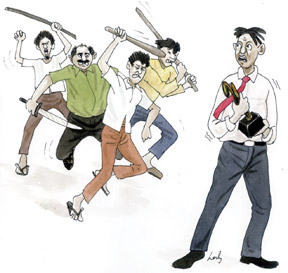Envying the winner
 The state literary award festival was held only recently. Sadly itís
losing its usual glamour. May be it had been held in months other than
September, but not in the recent history I remember. September has now
become a value-added month with 10-year old baby called International
Book Fair. When the State Literary Festival was held in October it made
a slight faux pas: itís now Ďoff-seasoní and the recognized books donít
draw customers. The state literary award festival was held only recently. Sadly itís
losing its usual glamour. May be it had been held in months other than
September, but not in the recent history I remember. September has now
become a value-added month with 10-year old baby called International
Book Fair. When the State Literary Festival was held in October it made
a slight faux pas: itís now Ďoff-seasoní and the recognized books donít
draw customers.
Well, this so called book fair didnít exist ten years ago, and the
State Literary Awards Festival is much older than its blossoming
counterparts. Ironically, sadly or funnily these blossoming
counterparts: Vidyodaya, Swarnapusthaka and Godage seem to have
outweighed their senior.
Now it is always good to accommodate award festivals along with the
book fair. The book fair has planted habits among readers. Most of them
save up money throughout the year just to buy books at the fair. Then I
donít have to emphasize that the recognized books attract some audience.
Luckily Jayatilaka Kammellaweera and Sunethra Rajakarunanayaka were up
on the deal because their novels had already been recognized ere the
state festival. Other works recognized at the state festival are hardly
discussed even in media.
 My muse, however, lies elsewhere. My muse, however, lies elsewhere.
When a certain work is honoured or recognized, it becomes a subject
among literati. At least that is what used to happen hot on the heels of
state literary festival. I am not that quick to say such a tradition is
vanishing now. But that tradition seems to swerve off the track.
Of course the winner causes rift among the losers and well-wishers of
the losers. They lay down some reasons why they opine a particular work
does not deserve laurels. But now Ė this year and last, that is Ė it has
not been quite so.
I hope you remember it was Kandak Se Ma which was the one and the
only best novel in all literary awards festivals last time. And this
time some chose Kavi Kandura. The common factor is that both novels are
written by women. To boot, I would say both novels were condemned,
rather than Ďcriticisedí. It was more personal revenge, I say.
Last time a professor occupied more than half broadsheet of a
national weekly for weeks to condemn Kandak Se Ma. And this time a
senior journalist occupied half broadsheet of a national daily. Both
these writers have a reputation for their scholarship Ė I bow my head to
that, of course. But how on earth could they sag down to condemn a
creator of a work of art? I question so, because both writers have
personally attacked the authors. The journalistís write-up clearly
indicated that he had not read Kavi Kandura at all. There was no mention
about the book, but derogatory remarks of authorís personal life.
I remember encountering a senior writer and a columnist. When I asked
why he chose not to review a certain book, he said he doesnít like it.
If he is to write, then itís all but positive. So the best thing, he
added, is not to write a review at all.
I do not want to teach you who a critic should be Ė you know it a lot
more than I do.
What I simply know is humanity is over and above anything and
criticism is no exception. Nor is it a license to wash the dirty linen
of your wrathful feelings against someone.
We must start questioning ourselves once again. The very first
question must be why we should write something. What do we gain out of
it?
What do you gain by filling halves of broadsheet with words of wrath
against someone? Iím talking about arts.
What can you get? Uplifting the standards? Paving the way for a
better literary environment? If that is your thinking, then you must be
heavily misled. There must be something acutely wrong somewhere in your
guidance.
Art is to heal and make us happy. Not to make us sick, and wrathful
words do nothing else.
Winner causes a rift among losers, so says one Dhammapada stanza.
There is more to it than the surface meaning. There must be a winner as
well as a loser. Both must learn to co-exist. The winner may lose
another time. We can say both should learn to be both winners and losers
and strike a balance between them. But that sounds philosophical and
quite unrealistic when it comes to practice.
Those grudges against the recognized books have a clear reason: envy.
You cannot see or feel it straight away. But it is envy, and you can
name whatever that goes with it. Art is considered to have an uplifted
personality, out of all professions. But artistes and critics are both
slaves of their emotions, just like any other professional. What should
a critic learn? He has many things to learn far before criticism itself.
That humanity is the essence in our life. Even negative criticism
should be sandwiched with the positive Ė then only can we go for a
better literary environment.
So stop envying the winner, please.
[email protected]
|



